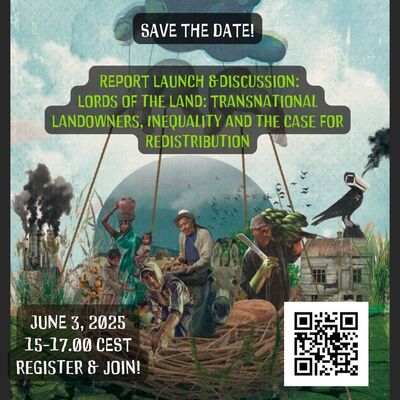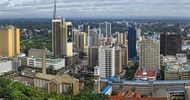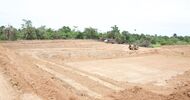On the margins of the annual World Bank land and poverty conference in April a donor roundtable agreed to establish a first global donor working group on land, which was launched recently. Video interview with the first chair of the group, from DFID.
- Donor Platform
-
01 September 2013
The returns on investments in South African farmland consistently outstrip those of local and international equities, bonds and real estate, says Futuregrowth Asset Management, the venture capital arm of Old Mutual.
- Financial Mail
-
30 August 2013
The promoters of Karuturi Global have been forced to increase their pledge towards the lenders by as much as 58% even as the company is trying to stabilise their operations in Ethiopia
- Business Standard
-
14 August 2013
Canadian billionaire Ned Goodman holds an 83% stake in Blue Goose Capital Corp. – the largest organic beef operator in North America that produces not only organic beef, but poultry and fish as well.
The Rockefeller Foundation says the 10,000 ha rice farm and outgrower scheme that Olam is constructing in Nigeria is a win-win land project.
The Ajeenkya D Y Patil Group of India has signed an MoU with the Government of Guyana for 65,000 ha in the Canje Basin, to be used for agriculture-related projects.
- Guyana Chronicle
-
21 July 2013
Investments by the World Bank's IFC in financial intermediaries are alleged to have financed 'land grabs' in South East Asia and violations of indigenous people's rights in Honduras.
- Bretton Woods Project
-
26 June 2013
Today, Fahamu Networks for Social Justice is hosting a national conference of social movements and other actors in Kenya to review the implementation process of the National Land Policy.
Farmers remain the main buyer group as they seek to expand their existing acreage, followed by UK investors and private purchasers, including overseas buyers taking advantage of the current weakness of sterling
- Property Wire
-
12 June 2013
Farmland has become the darling of alternative investing, sending hedge funds and wealthy investors into bidding wars for plots of land once deemed ordinary. And it is not just big money getting in on the game. From Stockholm to Chicago to Vancouver, ordinary investor money is pouring into fields around the world.
Ethiopia’s effort to resettle local farmers into main villages while also leasing land to foreign corporations or wealthy Ethiopians has put Gambella under scrutiny for charges of violent forced relocations.
Concerns mount among civil society groups that an agriculture project in Mozambique, which Tokyo is pushing through as one of its key projects in Africa, may end up depriving local farmers of their land.
Farmers in Mozambique are calling on the governments of Japan, Brazil and Mozambique to halt a project aimed at supporting agricultural development there, saying it will result in land grabs.
Audit says Liberian government failed to fully apply its own laws when awarding land concessions to palm oil companies Sime Darby and Golden Veroleum and recommends urgent remedial action
- Global Witness
-
22 May 2013
Since 2011, World Bank investments in large palm oil companies have virtually stopped, but it has backed off from applying the same approach to other crops, although the risks to local communities and indigenous peoples from land grabs from other agribusinesses are not much different.
The company will also seek to obtain land concessions for additional rice cultivation in the districts of Soukhouma and Sanasomboun.
- Vientiane Times
-
27 April 2013
Pressed on which countries in Africa would be suitable food sources, Hisham Abdullah Al Shirawi, the chairman of Economic Zones World, says the test would be countries where water was in abundance and which were not spoilt by strife.
- Halal Focus
-
15 April 2013
The "land grabbing" in Africa and elsewhere often triggers conflict, an underreported financial risk, says Samuel Nguiffo
The Chinese government has long encouraged businesses to invest in agriculture abroad, and Xi Jinping's first foreign trip as president in the past week involved visits to three African countries.
Reading between the lines, the Durban BRICS resolutions will support favoured corporations' extraction and land-grab strategies and confirm the financing of both African land-grabbing and the extension of neo-colonial infrastructure through a new 'BRICS Bank'
Bagamoyo villagers are up in arms over the government supporting an investor they accuse of grabbing about 6,000 hectares of their land in the district.
Land grabs in Canada have not been well-documented. Provinces do not keep inventory on large-scale land acquisitions. This blind eye approach has some people, particularly farmers, worried.
- Watershed Sentinel
-
07 Mar 2013
The private investment arm of the World Bank, is going to back the medium-term expansion of ETC Group (ETG), incorporated in Mauritius and specializing trading in food and drink products.
- Indian Ocean Newsletter
-
01 Mar 2013
With the coming of big industrial farms in Ethiopia, local people, villagers and pastoralists are being threatened, intimidated, forcibly displaced and herded into camps by the military, their homes destroyed.
- Redress Information & Analysis
-
01 Mar 2013
Normal work at the Sime Darby Plantation in western Liberia has been stalled for the second week running, as workforce presses for better salaries and improved working conditions, having accused management of bad labor practice.
- New Dawn
-
20 February 2013
Mugabe government is very reasonable about the perception of commercial agriculture being in foreign hands, says Standard Chartered.
If there is “blood diamond”, there is also such a thing as “blood maize”, “blood soya” and “blood pulses”.
- Business Standard
-
16 February 2013
Indian companies that have invested in agriculture in Ethiopia are under fire from civil society groups. The companies have been accused of large-scale land grabbing, which has led to displacement of the tribal population there.
- Business Standard
-
06 February 2013
Of the countries that lost the highest percentages of their cultivated land to land grabs, nine out of 10 have malnourishment rates of 5 percent or more.
- Mother Jones
-
06 February 2013
Risk analysts show that operational cost increases can approach 2,800 percent; Myanmar is latest flashpoint in alarming trend
















